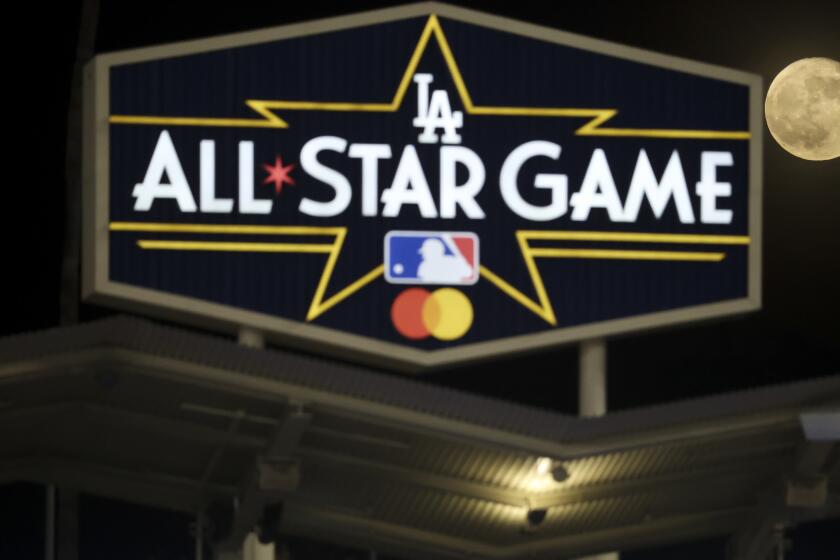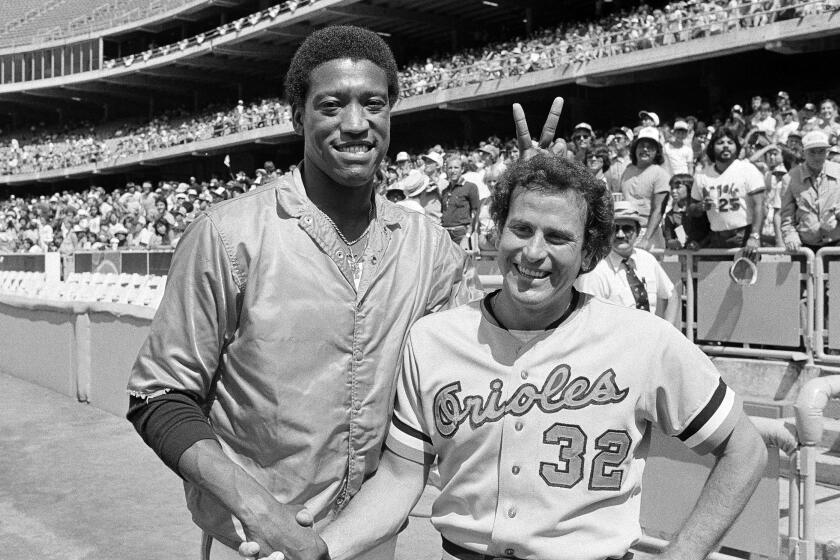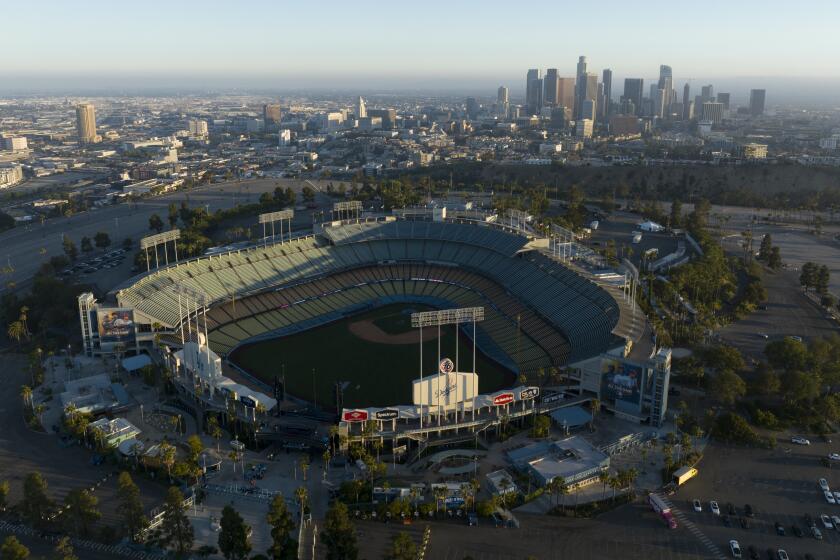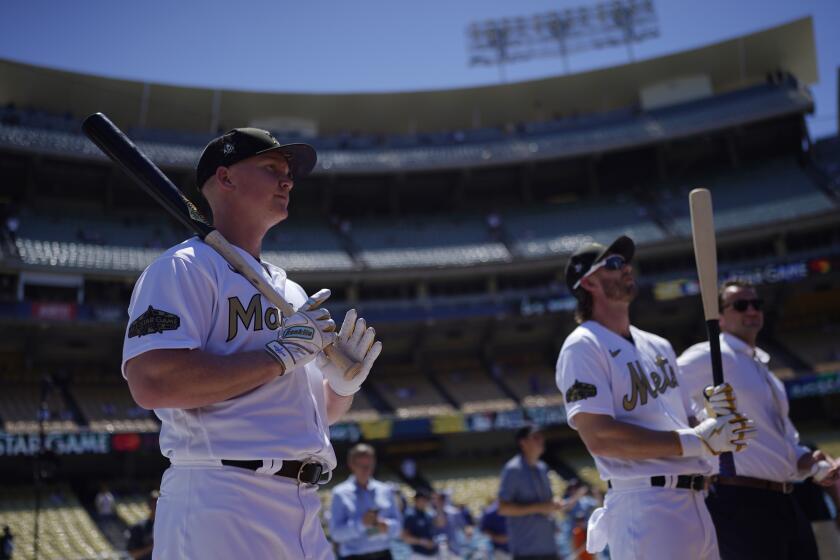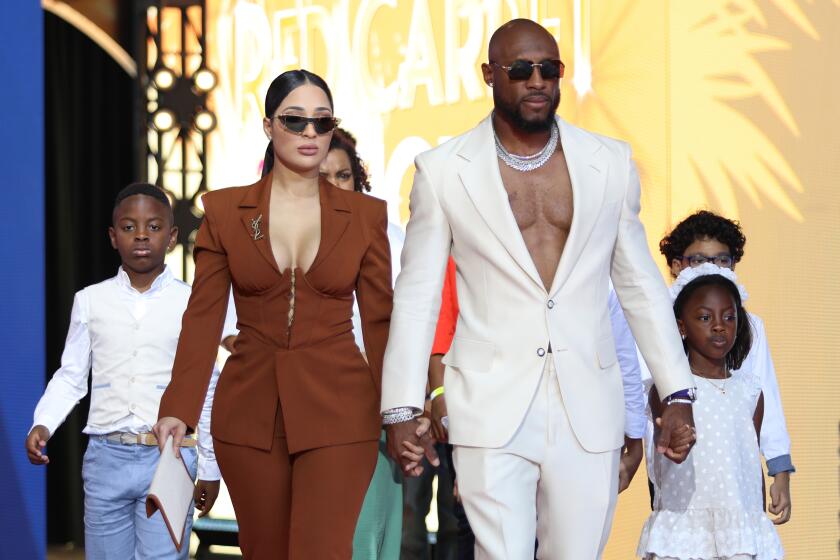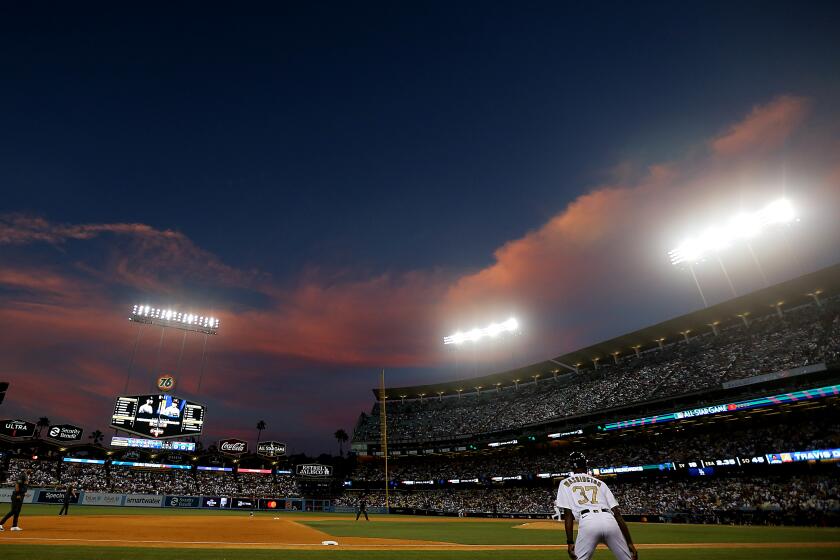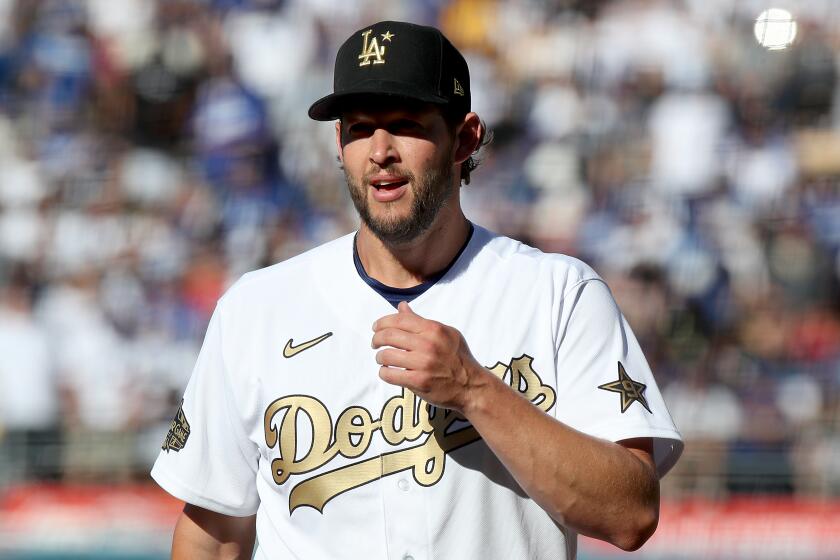Q&A: Rob Manfred on Trevor Bauer, payroll disparity, rule changes and TV blackouts
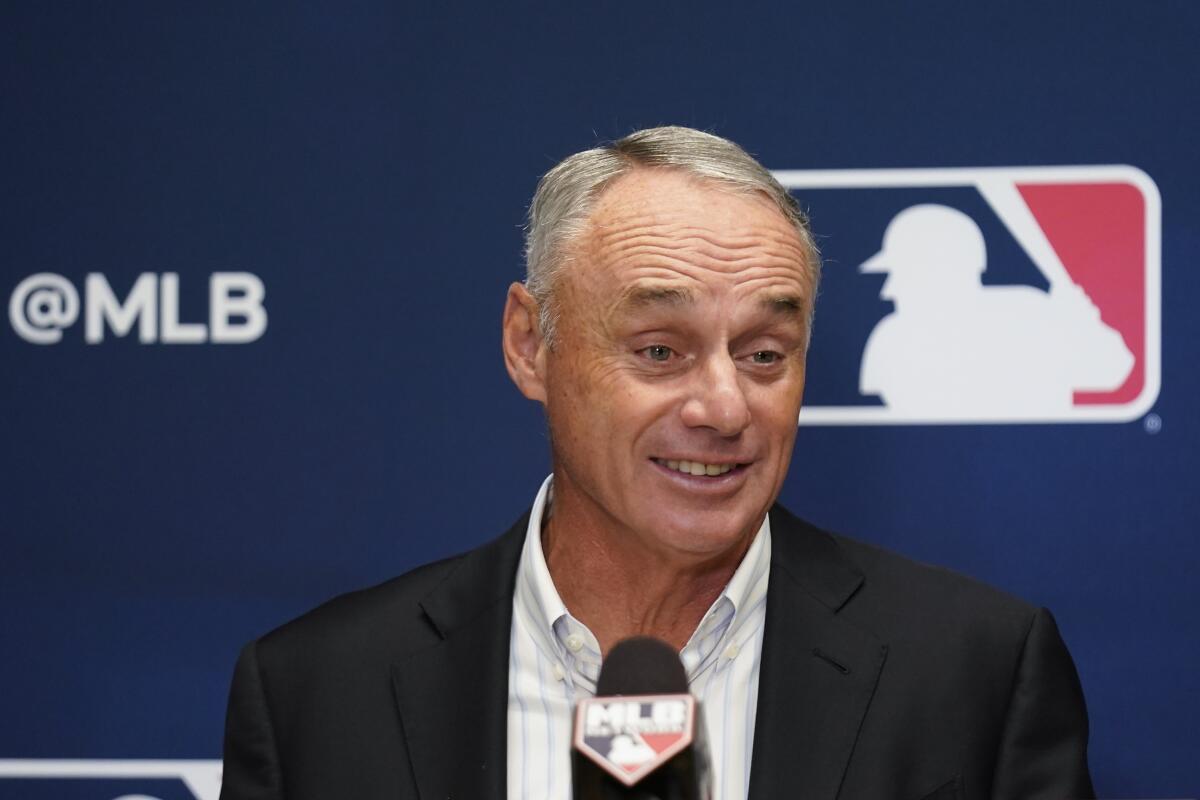
- Share via
NEW YORK — On July 8, 1980, the day of the last All-Star Game played at Dodger Stadium, the No. 1 song in America was Paul McCartney’s “Coming Up.”
In 2019, McCartney performed at Dodger Stadium. He’s still got it.
And, three years later, the All-Star Game is back at Dodger Stadium. Our favorite ballpark has still got it too.
Before the stars take the stage, I talked Dodgers and all things baseball with Rob Manfred, the major league commissioner. Here is a lightly edited transcript of the conversation:
Q: The All-Star Game celebrates the 60th anniversary of Dodger Stadium, but it also marks 10 years for the Dodgers’ ownership group. In 2012, after Frank McCourt had taken the Dodgers into bankruptcy, the team was auctioned to the highest bidder. With what you did not know then and what you do know now, how do you assess this ownership group?
Manfred: However we got here, I would say Mark [Walter], Todd [Boehly], Peter [Guber], Magic [Johnson], that whole group was an unalloyed success for baseball. Obviously, they put a tremendously competitive product on the field year after year. They have done a great job revitalizing Dodger Stadium, which I still view as a really important part of our history.
Mark, in particular, has emerged as a real forward-thinking, significant thought leader among ownership.
Q: Can you give me an example of that?
Manfred: I think probably the best example is, he’s on our local media committee, dealing with the future of what our local broadcasts are going to look like. He has been phenomenal in terms of putting aside his Los Angeles hat and thinking about what is best for growing our overall business for all 30 clubs.
Q: As you know, there are plenty of fans across America who say, “Well, of course the Dodgers are good! Look at their payroll.” What would you say to those fans?
Manfred: We have had significant payroll disparity in baseball for the entire time I have been involved. I think, fortunately, our game is unpredictable enough that, despite persistent disparity, we have had a really fairly good record of competitive balance.
We haven’t had repeat winners year after year. I think that speaks to the quality of the game, and the entertainment value of the game. It’s not always dollars that dictate the result.
Q: Do you believe baseball has gotten to a point where smart management can outweigh a low payroll?
Manfred: That’s a really hard question. I would say this: I think good management is necessary to have any chance to overcome the advantage that is created by payroll disparity.
Q: When the ruling on Trevor Bauer’s appeal of his suspension comes in, we will hear only that the suspension has been upheld, reduced or overturned, correct?
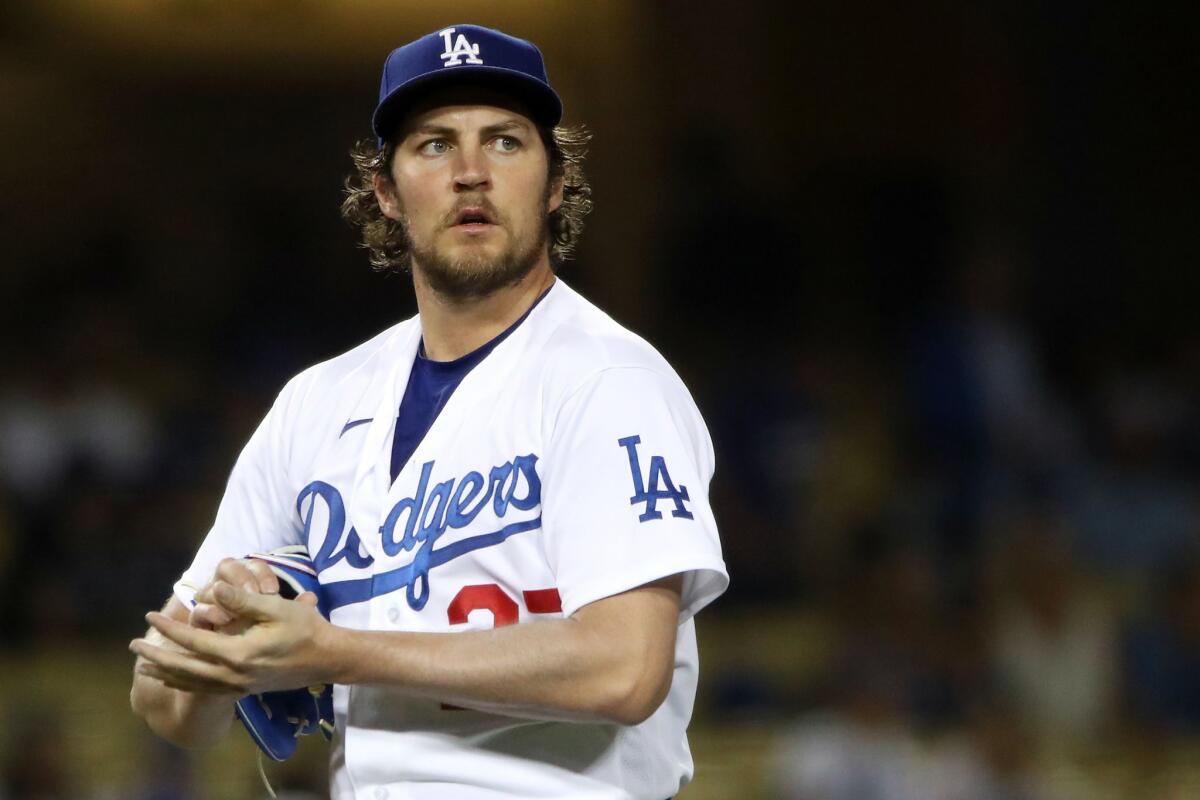
Manfred: It depends on what the arbitrator writes. Ordinarily, if the arbitrator writes an opinion, we don’t make it public. So I suspect that’s right, but that’s really up to the arbitrator.
Q: Can the opinion be made public? Baseball’s domestic violence and sexual assault policy says: “The confidentiality of player information is essential to the success of this policy.”
Manfred: The arbitrator will decide what that language means in the context of this case.
Q: I ask because this is the first time a player has challenged a suspension under that policy. Bauer and his representatives have pointed out a judge declined to uphold a restraining order against him, and a district attorney declined to file criminal charges against him. Bauer says he has done nothing to warrant a suspension.
Yet you have suspended Bauer for two years — that is, twice as long as anyone else has been suspended under this policy. At the conclusion of the appeal, how are fans — and other players — to know exactly what Bauer did that you determined warranted a suspension?
Manfred: I hate to do this to you but, with that one pending, I’m just not comfortable talking about it.
Q: Average attendance this season is at its lowest since 1995, a season which was delayed by a player strike, and otherwise since 1988. What do you believe explains this decline, and how are you working to reverse this trend?
Manfred: I think the decline is principally related to the pandemic. Obviously, we’ve had two really difficult years. I’m a glass-half-full guy. We think we’re going to be back to 95% of our 2019 level. When you go through a period of time like we’ve gone through, you’re going to have damage to your business, and it takes time to build it back.
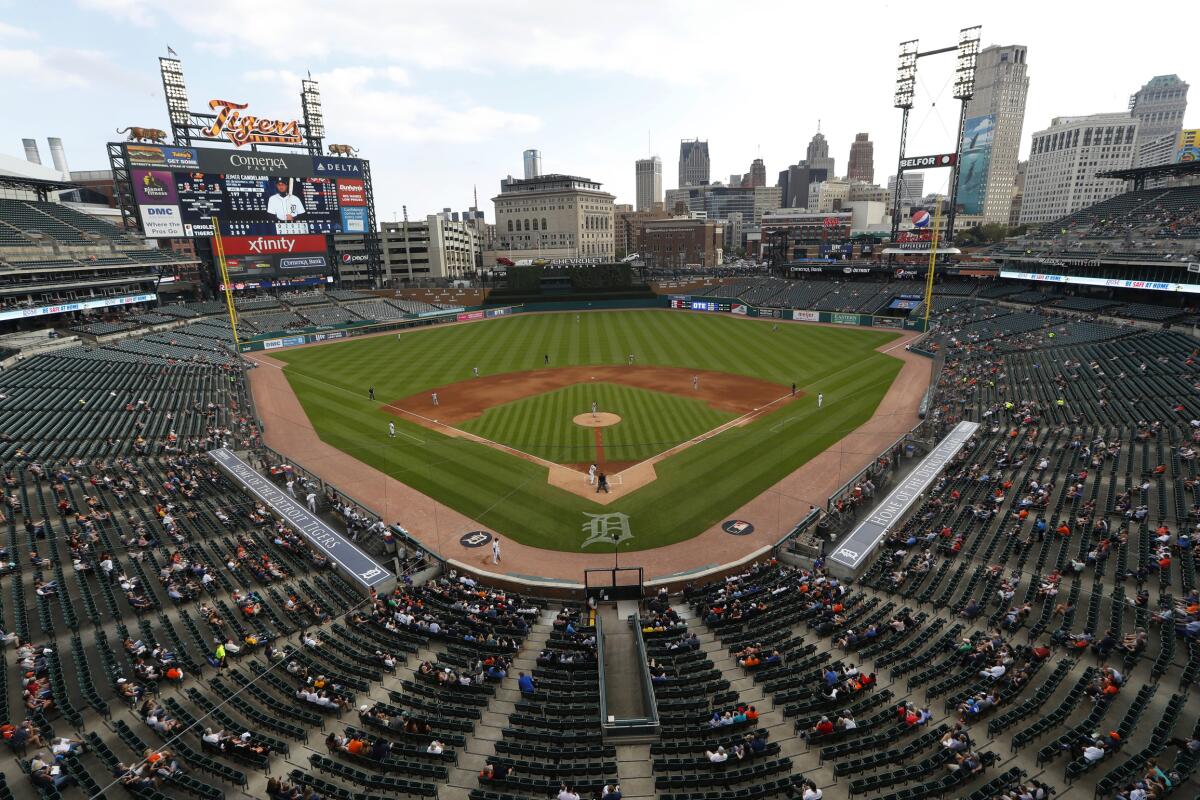
(Average attendance through Wednesday: 25,927; in 2019: 28,203; in 2007: a record 32,696; in 1995: 25,021; in 1988: 25,237; data via baseball-reference.com.)
Q: Half an hour has been cut from minor league games in which a pitch clock is used. If the competition committee decides to recommend a pitch clock in the major leagues next year, is it as simple as saying half an hour would be cut from major league games?
Manfred: No, for two reasons. The major leagues are different than the minor leagues. Every time you talk to a major league player, they remind you of that fact — and I’ve been talking to a lot of them! And I don’t think the issue in front of the competition committee is as easy as pitch clock or no pitch clock.
What are all the little rules that are going to go along with it? Which ones that we are using in the minor leagues may need to be modified for use in the major leagues? So I don’t think you can just jump to the conclusion it’s going to be the same savings.
(The minor league pitch clock has reduced the average time by 28 minutes, with more action: fewer walks, fewer strikeouts and a 26% increase in stolen bases, according to data compiled by MLB.)
Q: Do you have fan studies or marketing surveys that tell you attendance will go up if time of game does go down by half an hour? Or is this just a logical conclusion?
Manfred: Our fan research suggests time of game is a limiting factor in terms of fandom and consumption. There is absolutely no question about that.
Q: Gabe Kapler, the Giants’ manager, went to the mound the other day to tell the outfielder he had pitching not to throw so hard, so he wouldn’t risk getting hurt — in a game the Giants won.
Steve Stone and J.R. Richard were the starting pitchers in the 1980 All-Star Game at Dodger Stadium. By the end of the 1981 season, their careers were over.
When position players rarely pitched, it was a great, fun story. Now, even with 13 pitchers on a team, it’s become routine and arguably silly. Can you envision giving teams the choice between using actual pitchers or just calling off the rest of the game?
Manfred: The increased trend of using position players as pitchers, particularly when there are other indications of noncompetitiveness, is not a positive force. It’s something we need to think about.
Q: Is the competition committee charged with thinking about that?
Manfred: I’m sure it will be an issue this offseason.
Q: The average price of a major league ticket this season is $36, which means a family of four pays $144 before parking, eating or buying any souvenirs. Teams do have promotions: The Orioles let kids in free, for instance, and the Angels offer a family four-pack for $44. But how concerned are you about pricing out the middle-class family, and with it the kids who would become your next generation of customers?
Manfred: Not only am I concerned, I think the clubs are concerned. That’s why you see clubs have family-focused promotions, like the one you’re talking about with the Angels. I think the Angels have been particularly good on this topic, for a very long period of time. We pay real attention to the price issue. It has been a topic in owners meetings.
We understand that for family groups, which are a really important part of our fan base, affordability is a big issue.
Q: Is there any league mandate clubs need to follow with regard to affordability, or is it up to each club?
Manfred: The clubs. There are just too many differences between markets, in terms of who they draw and what the demographics are in each market, for us to try to regulate that. It’s always been a local issue.
Q: Let’s say I am a fan who can’t get to the ballpark, and I want to do one thing: I want to watch whatever game I want, wherever I live and I don’t want to get a headache trying to figure out which channel or streaming service has the game I want to watch on any given night. I will happily pay you for this. Can you explain to me how soon I might be able to do that, and what has to happen between then and now?
Manfred: You certainly have the right person as commissioner of baseball because, if there is one thing I could wish for, more than anything else, it would be the ability to give our fans that frictionless experience of being able to watch what they want to watch, where they want to watch. There is no project that we are spending more time on in the central office than trying to achieve the goal you just articulated.
Q: So what has to happen?
Manfred: There is a lot of wood to chop. It is going to involve fundamental reordering of the control of rights in the industry. It is going to involve conversations with our partners in the broadcast space, including RSNs (regional sports networks like SportsNet LA and Bally Sports West) and distributors. It is a massive undertaking, which is the bad news.
I think the good news is, there is a realization in the industry that, in order for this business to be all it can be, we need to undertake an effort to get as close to the model you are talking about as possible.
Q: Is that a five-year project? A 10-year project?
Manfred: It will not be a 10. It is going to happen sooner than that.
Q: I was on the MLB website the other day, and a fan survey randomly popped up. This was one of the questions: “Do you find sports betting advertising (on television or in-stadium) to be distracting or inappropriate?” The next question: “What is your perception of legalized betting on baseball? Positive, negative, or no opinion?”
What concerns might the league have that prompted these questions?
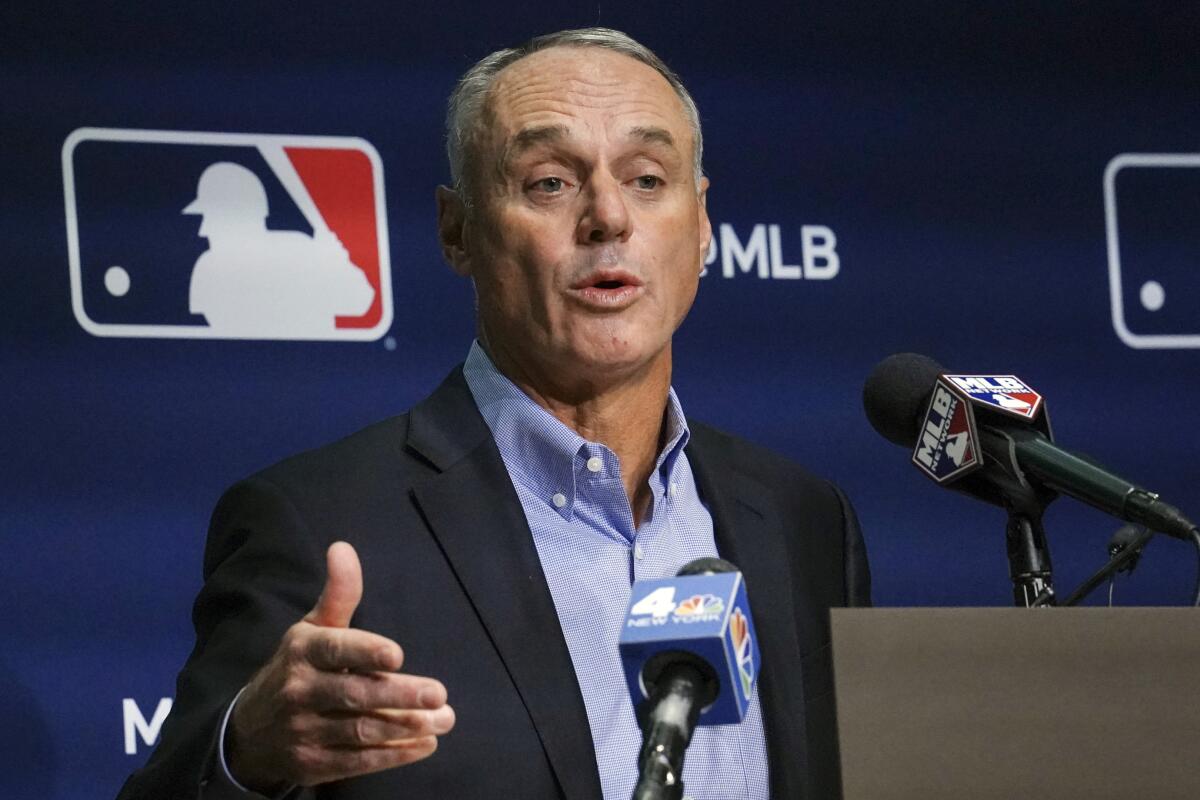
Manfred: From the very beginning, when we realized that there was likely to be a change in the law, we put together a task force that did a ton of background work on sports betting, spent a ton of time in Europe, in places where sports betting had become pervasive. One of the concerns that was expressed was the gaming aspect of it becoming too intrusive on the sport — where you see it, the advertising, whatnot.
We have tried to be extremely sensitive to that issue moving forward. We are a family product. Sports betting is legal. I get it. But it’s not for everybody. We have tried to be sensitive to the fact that it’s not for everyone.
I think the legalization issue, the second question: People have different reactions to sports betting in the game. For us, the key distinction is always what a fan can do and what somebody involved in the game can do, in terms of protecting the integrity of the sport. We try to drive that issue whenever we talk about sports betting.
Q: I can’t go on your website or watch a game without almost inevitably seeing some reference to sports betting — and I live in California, where it’s not even legal. Is there some thought that baseball might have gone too far in promoting sports betting, or that you need to calibrate where you are?
Manfred: I think there is an ongoing effort to strike the appropriate balance between using sports betting as a way to drive fan engagement and being too intrusive.
Q: The A’s would like to know by the end of this year whether their waterfront ballpark project in Oakland will be approved. If not, they have made no secret that Las Vegas is their Plan B.
In 1992, when the Giants ownership could not secure a new ballpark in the Bay Area, the team was about to move to Florida when MLB stepped in. New local owners were found, and the Giants have been a model franchise since then, with a beautiful new ballpark in San Francisco.
The third-oldest stadium in baseball, Dodger Stadium remains one of the best. On Tuesday, it will host the All-Star Game for the first time since 1980.
If the A’s ownership cannot get the waterfront ballpark done, would you step in to try to find new local owners before you would approve a move?
Manfred: I think the A’s situation is different than the situation that existed when baseball stepped in with respect to the Giants. Number one, I think (A’s owner) John Fisher — really at my urging — has done everything humanly possible to find a viable stadium plan in Oakland. He’s spent millions and millions of dollars. He’s focused solely on Oakland for years.
Secondly, unlike the San Francisco situation, Oakland was granted permission to explore the Las Vegas alternative, for the simple reason that the progress in Oakland at the time was not far enough or fast enough. Having said all that, Mayor [Libby] Schaaf has done an unbelievable job moving the process forward. I’ll say it for the second time: I’m a glass-half-full guy. I hope she delivers.
Q: With all due respect, John Fisher has done everything humanly possible in Oakland except consider the site where the A’s are playing now. He might not want to play there, but what the Angels were proposing in Anaheim could basically have been the same in Oakland: a parking lot, with easy access and mass transit, redeveloped into an urban village.
Manfred: A couple of things. Number one: When you’re going to privately finance a ballpark, to the tune of a billion dollars, I think you’re entitled to a certain amount of respect, with respect to where you want to make that investment. Number two: I think the economics of development at the Coliseum site are not comparable to the economics of development in a place like Anaheim.
Q: When the Supreme Court announced its decision to overturn Roe v. Wade, the NBA issued a statement in reaction. Major League Baseball did not. What went into the decision not to issue a statement?
Manfred: This is a really personal issue. People have widely varying views on the topic, and they are deeply held. From my perspective, to make a statement on behalf of the organization, given those differing views, was not something that I felt was appropriate.
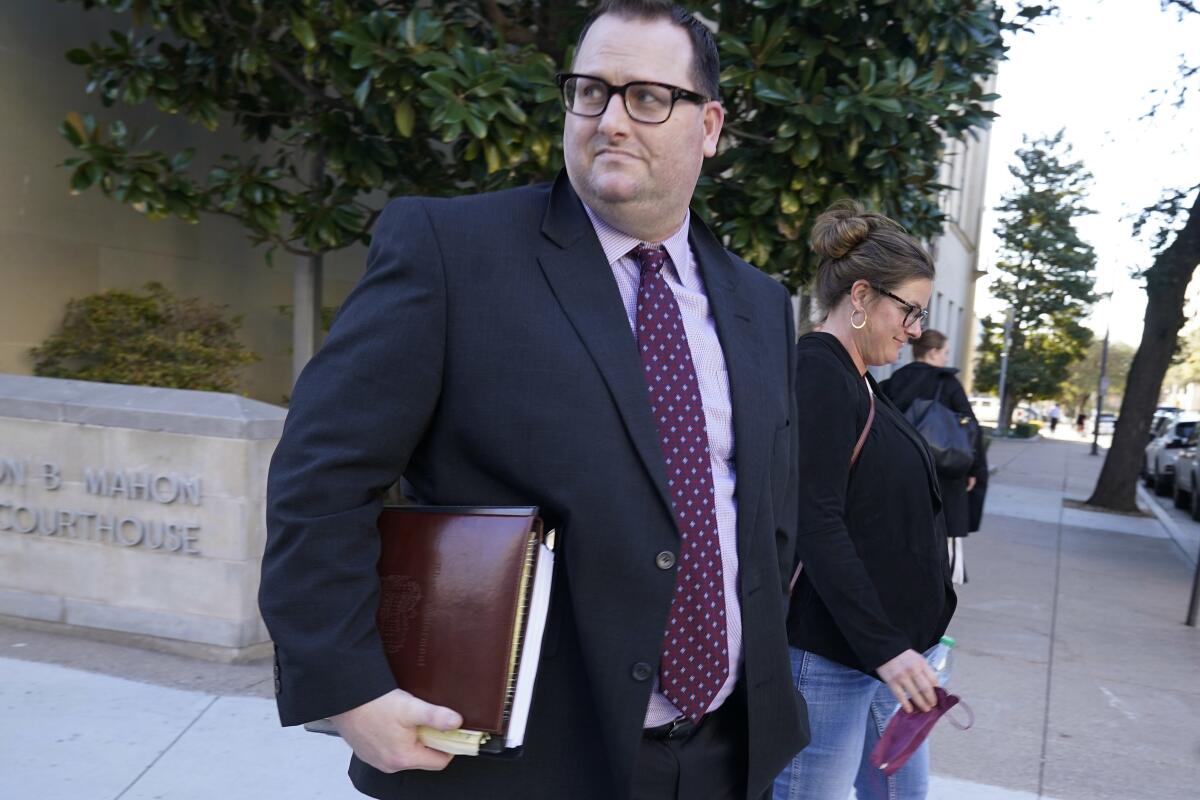
Q: The Angels are being sued by the family of Tyler Skaggs, saying the team knew or should have known that former staffer Eric Kay was supplying players with drugs, a claim denied by the Angels.
The Angels’ stadium deal collapsed amid an FBI investigation into alleged corruption by the now-former Anaheim mayor. The FBI affidavit does not allege any wrongdoing on the part of the team. But the Angels have worked on a stadium deal for a decade, and now they are seven years from the end of their lease, with at least the possibility their ballpark situation could evolve into something like the ones in Oakland and Tampa Bay.
Without asking you to comment specifically on pending or potential legal matters, it is safe to say the Angels are dealing with off-field issues, as well as a continued inability to field a winning team despite the presence of Mike Trout and Shohei Ohtani. Are you concerned about the direction of the Angels?
Manfred: I have confidence in the people that own and operate the Angels. You went through issues. Organizations face issues routinely. I think, over time, the Angels have done a really good job of putting a product on the field that attracted people. They had a run of 3 million in attendance for a number of years. I have confidence that they are going to make good decisions going forward.
(The Angels sold more than 3 million tickets every year from 2003-19).
Q: You have served seven years as commissioner. What would you say has been your proudest accomplishment, and what would you say has been your greatest challenge?
Dodger Stadium is a distinctly wonderful place to watch a baseball game, but a most difficult place to attend a baseball game.
Manfred: I think that I am proudest of the progress we have made in youth participation. Our participation numbers have improved dramatically.
(Baseball and softball combined attracted 6.5 million participants last year among youth aged 6-12, more than any other sport, according to the Sports and Fitness Industry Association.)
I think youth participation is crucial to the future of fandom of the sport. I think our youth programs have resulted in an increase in diversity in our draft that I think is critical to the product we put on the field in the future. If you want to sell a product to America, you’ve got to look like America. Having 20-plus-% of our first-rounders being African American is a really important development of this sport.
I think the biggest challenge is something you and I talked about a few minutes ago. Our reach, in terms of putting games in front of people who want to watch games, is not what it should be. We’re operating in a media environment that has changed dramatically and is changing even more rapidly. We need to operate in a way that allows people to watch the game they want to watch, where they want to watch it.
Q: What would you like to share with fans?
Manfred: I’d like fans to be as excited about the second half of the season as I am. We’re going back to the Field of Dreams. That was an unbelievable experience. I think, particularly given the expanded playoffs, we are going to have more good pennant races in more markets than we have ever had. I personally think the new playoff format is going to be awesome. So I am excited about the second half.
More to Read
Go beyond the scoreboard
Get the latest on L.A.'s teams in the daily Sports Report newsletter.
You may occasionally receive promotional content from the Los Angeles Times.

